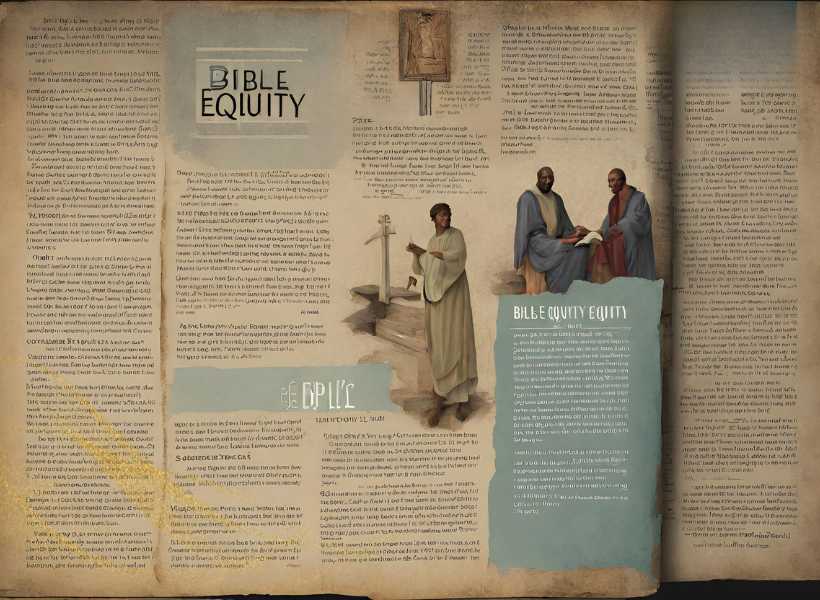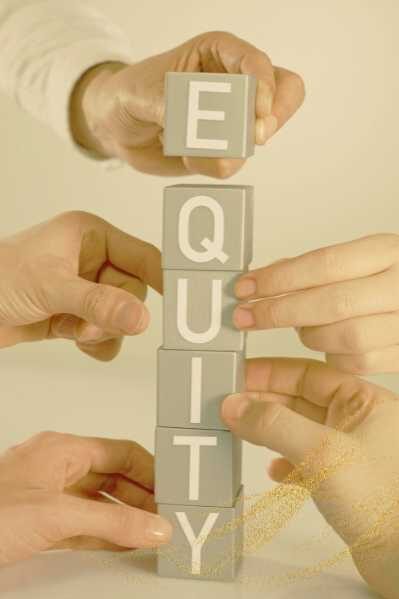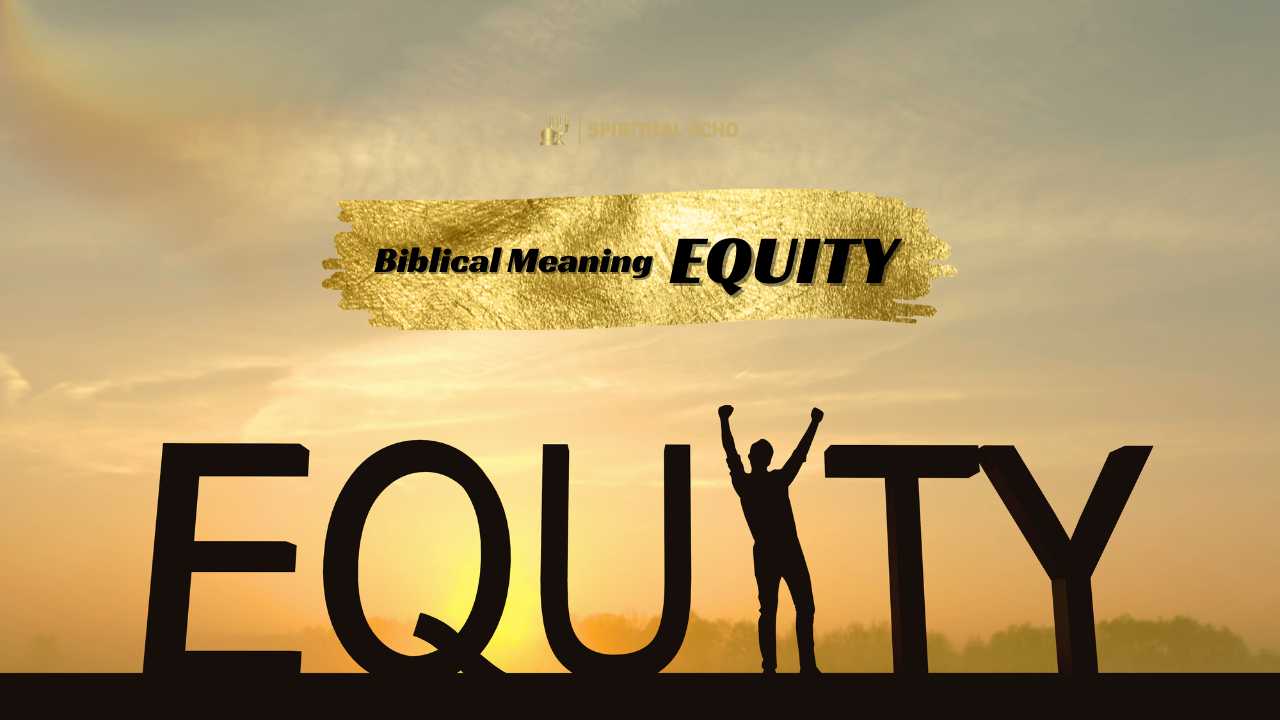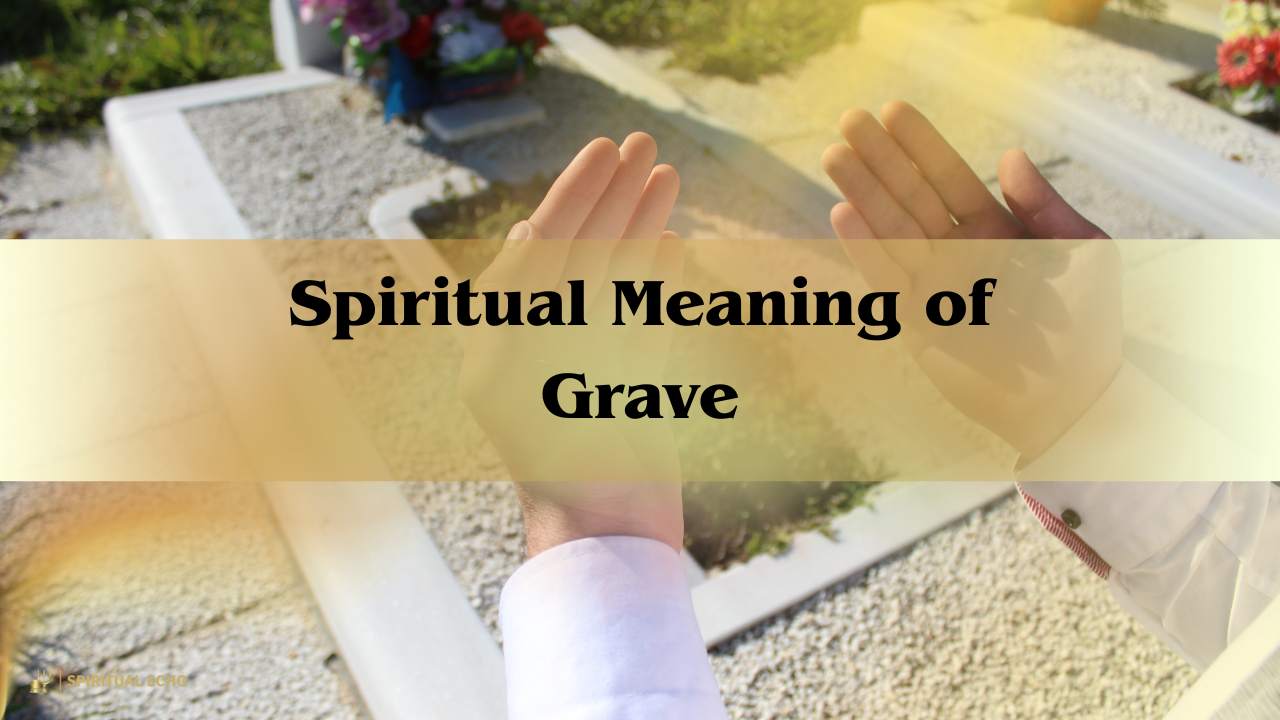The biblical meaning equity refers to fairness, justice, and impartiality. In the context of the Bible, equity emphasizes treating people with equality and ensuring that everyone is given what is right and just.
It reflects the idea of fairness in God’s eyes, promoting a balanced and righteous approach to relationships and dealings with others.
The concept of equity in a biblical sense encourages believers to act justly and to strive for a world where everyone is treated with dignity and equality, mirroring the values and principles found in the teachings of the Bible.
What is the biblical meaning of equity? The biblical meaning of equity is about fairness and justice based on God’s principles. In the Bible, equity emphasizes treating everyone impartially and ensuring that each person receives what is right and just. The concept encourages believers to act in ways that promote equality and uphold moral principles.
- Biblical Meaning Equity: Brief Overview
- Understanding The Biblical Concept Of Equity
- Equity As A Principle Of Justice In The Bible: Biblical Justice
- Examples Of Equity In Biblical Teachings And Stories
- The Connection Between Equity And Righteousness
- Applying The Biblical Meaning Of Equity In Modern Society
- Advocating For Social And Economic Equity In Communities
- Promoting Fairness And Justice In Personal Relationships
- Overcoming Biases And Prejudices To Embrace Equity
- Embracing The Biblical Call To Treat Others With Impartiality
- The Role Of Equity In Building Strong Communities And Relationships
- FAQ About Biblical Meaning Equity
- Final Thought 💭
Biblical Meaning Equity: Brief Overview
This biblical concept emphasizes a sense of integrity in our dealings with others. It encourages individuals to act in ways that align with God’s standards of righteousness, showing a community where justice and fairness prevail.
The biblical meaning of equity challenges believers to champion the cause of the marginalized, ensuring that everyone is treated with dignity and equality.
This principle underscores the idea that, in God’s eyes, every individual is deserving of respect and fair treatment, regardless of their background or circumstances.
As believers seek to embody the biblical meaning of equity, they contribute to the establishment of a society where compassion, fairness, and justice are not just ideals but lived out in everyday interactions and relationships.
Equity Meaning
Equity refers to fairness and justice in a straightforward sense. It is about treating everyone fairly and making sure that each person gets what is right and just.
In everyday life, equity meaning, giving everyone a fair chance and not favoring one person over another. It is like playing by the rules and making sure that nobody is treated unfairly.
In a broader context, equity also means considering people’s different needs and circumstances and ensuring that everyone has equal opportunities and is treated with respect.
When we talk about equity, we are talking about creating a level playing field and making sure that everyone gets a fair shake.


Spiritual Equity Meaning
Spiritually, the meaning of equity involves fairness and justice guided by higher principles. It’s about treating others with a sense of righteousness and impartiality, aligning one’s actions with spiritual values.
Spiritual equity meaning context, and equity goes beyond mere fairness, it encompasses the idea of recognizing the inherent worth and dignity of each individual.
Practicing equity spiritually involves approaching relationships and situations with a compassionate and just mindset, ensuring that everyone is treated with respect and kindness.
Equity Hebrew Definition
In Hebrew, the term for equity is related to the word “mishpat,” which means justice. In a biblical sense, equity is connected to the idea of fair and just treatment, aligning with God’s principles.
Equity Hebrew definition emphasizes the importance of righteous judgment and impartiality in dealing with others.
In the Hebrew context, equity implies not only giving people what they deserve but doing so with a sense of fairness and adherence to moral standards.
It reflects a commitment to justice that is rooted in the understanding of God’s righteous nature, aiming for a society where each person is treated equitably and justly according to divine principles.
Examples Of Equity In The Bible: Bible Define Equity
The Bible provides several examples of equity, highlighting the importance of fairness and justice. Examples of equity in the bible are found in the teachings of Jesus, who consistently treated people from all walks of life with compassion and equality.
In the parable of the Good Samaritan, Jesus emphasizes the concept of helping others regardless of their background or social status.
Another example is the biblical principle of gleaning, where farmers were instructed to leave some of their harvests for the poor to gather, ensuring that everyone had enough to eat.
The Old Testament also includes laws promoting fair treatment, such as not showing partiality in judgment and caring for widows and orphans.
These examples illustrate the biblical emphasis on established equity, urging believers to act justly, love mercy, and walk humbly in their interactions with others, reflecting God’s principles of fairness and compassion.

Understanding The Biblical Concept Of Equity
Understanding the biblical concept of equity involves grasping the idea of fairness and justice as emphasized in the teachings of the Bible.
In simple terms, it means treating everyone with impartiality and ensuring that each person is given what is right and just.
The Bible encourages believers to act in ways that promote equality and uphold moral principles. This concept extends beyond mere fairness, emphasizing the importance of compassion and righteous judgment in our dealings with others.
The biblical understanding of equity calls for a community where everyone is treated with dignity, regardless of their background or circumstances.
It encourages individuals to embody the principles of fairness and justice found in the Bible, showing a compassionate and just society.
Equity As A Principle Of Justice In The Bible: Biblical Justice
Equity, as a principle of justice in the Bible, revolves around the idea of fair and impartial treatment for all. It emphasizes treating people with equality and ensuring that everyone is given what is right and just.
This biblical concept of equity encourages believers to act in ways that uphold moral principles and righteousness. Throughout the Bible, there are teachings and examples that highlight the importance of fairness, such as the Golden Rule and the call to care for the vulnerable.
Equity goes beyond just following rules, it involves a compassionate and considerate approach to others, reflecting God’s standard of justice.
The principle of equity in the Bible guides believers to create a just and caring community where everyone is treated with dignity and fairness.

Examples Of Equity In Biblical Teachings And Stories
Biblical teachings and stories offer various examples of equity, emphasizing the importance of fairness and justice. Jesus’ parables, like the Good Samaritan, highlight treating everyone with compassion and fairness, regardless of their background.
The Old Testament introduces the principle of gleaning, ensuring that the poor have a share in the harvest. Laws against showing partiality in judgment and caring for widows and orphans underscore the commitment to fairness.
The biblical narrative consistently encourages believers to act justly, love mercy, and walk humbly, embodying the principles of equity in their interactions with others.
These examples illustrate the enduring theme of fairness and justice in the Bible, urging individuals to create a community where everyone is treated with dignity and equality.
The Connection Between Equity And Righteousness
The connection between equity and righteousness lies in the shared principles of fairness and moral correctness. Equity involves treating everyone impartially, ensuring that each person receives fair and just treatment.
Righteousness, on the other hand, encompasses living in a way that aligns with moral and ethical standards. In the context of equity, righteousness emphasizes the right and just treatment of others.
The Bible often connects these concepts, highlighting the importance of both fairness and moral uprightness in our actions.

When individuals strive for equity, they contribute to a righteous and just society where everyone is treated with dignity and respect, reflecting the shared values of fairness and moral integrity.
dignity
respect
integrity
Applying The Biblical Meaning Of Equity In Modern Society

Applying the biblical meaning of equity in modern society involves putting into action the principles of fairness and justice found in the Bible. It means treating everyone with impartiality and ensuring that each person is given what is right and just.
In practical terms, this could mean advocating for equal opportunities, standing against discrimination, and helping those who are in need.
It also involves showing a compassionate and inclusive community where everyone is treated with dignity, regardless of their background.
Applying the biblical meaning of equity in our daily lives, we contribute to creating a society that reflects the values of fairness, justice, and compassion outlined in the teachings of the Bible.

Advocating For Social And Economic Equity In Communities
Advocating for social and economic equity in communities means pushing for fairness and balance in how opportunities and resources are distributed among people.
It involves standing up for justice, ensuring that everyone, regardless of their background, has a fair chance to thrive.
This advocacy can take various forms, such as supporting policies that address income inequality, promoting access to education and healthcare for all, and challenging discriminatory practices.
By championing social and economic equity, individuals and groups aim to create communities where everyone can participate fully and benefit equitably, showing an environment that reflects the values of fairness and inclusivity.

Promoting Fairness And Justice In Personal Relationships
Promoting fairness and justice in personal relationships involves treating others with equality and ensuring that everyone is treated fairly. It means being impartial, avoiding favoritism, and considering the needs and perspectives of others.
In personal relationships, fairness can be shown by listening attentively, respecting boundaries, and making decisions together.
Justice, in this context, involves resolving conflicts in a fair and reasonable manner, considering the feelings and concerns of all parties involved.
By prioritizing fairness and justice, personal relationships can thrive on mutual respect and understanding, creating a positive and harmonious environment for all involved.

Overcoming Biases And Prejudices To Embrace Equity
Overcoming biases and prejudices to hold equity involves recognizing and challenging our preconceived notions about others. It means being open-minded and treating people fairly, regardless of differences.
This process requires acknowledging and questioning any unfair judgments we might have and actively working towards a more inclusive mindset.
Holding equity involves valuing each individual for who they are and giving everyone an equal opportunity to succeed.
Overcoming biases and prejudices, we contribute to creating a more just and harmonious society where everyone is treated with dignity and respect, irrespective of any pre-existing judgments.

Embracing The Biblical Call To Treat Others With Impartiality
Embracing the biblical call to treat others with impartiality means adopting a mindset of fairness and equality in our interactions.
The Bible encourages us to treat everyone with the same level of respect and consideration, without favoritism or discrimination.
It emphasizes the idea that each person is valuable and deserving of fair treatment, reflecting the love and impartiality taught in biblical principles.
By holding this call, we strive to set aside biases and judgments, treat others as equals, and show kindness to all.
It is about embodying the essence of fairness and impartiality, as encouraged by the teachings of the Bible, in our daily lives and relationships.
The Role Of Equity In Building Strong Communities And Relationships
The role of equity in building strong communities and relationships is crucial for creating a foundation of fairness and trust.
Equity involves treating everyone with impartiality, ensuring that each person has equal opportunities and is valued for their uniqueness.
In communities, this means promoting inclusivity, addressing disparities, and showing a sense of belonging for all members. In relationships, equity is about mutual respect and shared responsibilities.
When equity is prioritized, it builds a framework where individuals feel heard, understood, and supported.
It contributes to the development of strong bonds, as people collaborate and communicate with a sense of fairness, ultimately creating communities and relationships that thrive on equality and understanding.


FAQ About Biblical Meaning Equity
What Is The Meaning Of Equity In The Bible?
In the Bible, equity means fairness, justice, and righteousness. It’s about treating people with impartiality, ensuring everyone gets what is right. This concept emphasizes righteous and compassionate interactions, reflecting God’s principles. Believers are encouraged to embody equity, fostering a world where each person is valued and treated with dignity, in line with biblical teachings.
What Does It Mean That God Will Judge With Equity?
The idea that God will judge with equity means that divine judgment is fair and just. God considers each person impartially, ensuring righteous judgment. This concept reflects the belief that God’s assessments are based on fairness and morality, emphasizing equitable treatment for all individuals in accordance with divine principles.
What Does The Bible Say About Equity And Justice?
The Bible emphasizes equity and justice, urging believers to treat others fairly. It calls for impartiality, kindness, and standing up for the oppressed. Verses like Micah 6:8 highlight God’s desire for righteousness, mercy, and walking justly. The Bible’s teachings underscore the importance of creating a just and compassionate society based on biblical principles.
What Is Equity In Proverbs?
In Proverbs, equity refers to fairness and justice. The wise sayings in Proverbs highlight the importance of treating others justly and impartially. Proverbs 21:15 notes that when justice is done, it brings joy. So, in the context of Proverbs, equity involves living and acting in a way that aligns with righteous and fair principles.
What Does The King James Bible Say About Equity?
The King James Version of the Bible contains several references to equity, emphasizing the importance of fairness, justice in society, and righteousness in dealings with others.
Is There A Court Of Equity Mentioned In The Bible?
While the concept of a specific “court of equity” as known in legal systems today may not be directly mentioned in the Bible, the principles of fairness, justice, and the spirit of equity are integral to biblical teachings and are reflected in various passages.
Where Can I Find References To Equity And Equality In The Old Testament?
The Old Testament contains numerous references to equity and equality, particularly in books such as Psalms and Proverbs, where the themes of justice and fairness are prevalent.
Final Thought 💭
The biblical meaning of equity boils down to a fundamental idea of fairness and justice. It is about treating everyone impartially, just as the Bible teaches.
Equity goes beyond mere equality, it involves recognizing the worth of each individual and ensuring that everyone is treated rightly.
The biblical perspective on equity emphasizes living with compassion, righteousness, and a commitment to justice in our interactions with others.
By understanding and applying this concept, we contribute to building a world where everyone is treated with dignity and fairness, aligning our actions with the timeless values found in the teachings of the Bible.
Enhance Your Soul Spiritually By Reading More Articles About Spiritual Awakening
- Bible Symbolism: Recognize And Understand Biblical Symbolism
- Biblical Meaning With: Meaning Of Biblical Definition
- Biblical Meaning Obedience: Importance Of Obedience To God
- Which Biblical Meaning: Bible Definition
- Jireh Biblical Meaning: Meaning Of Jehovah Jireh
- Spiritual Meaning Of Xavier In The Bible: Xavier Name Meaning
- What Is PT In The Bible: Books Of The Bible Of Old Testament
- Spiritual Meaning Of Oil In The Bible: Metaphor For The Holy Spirit



































Leave a Reply